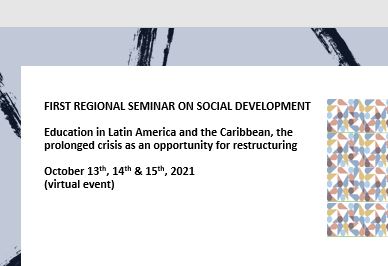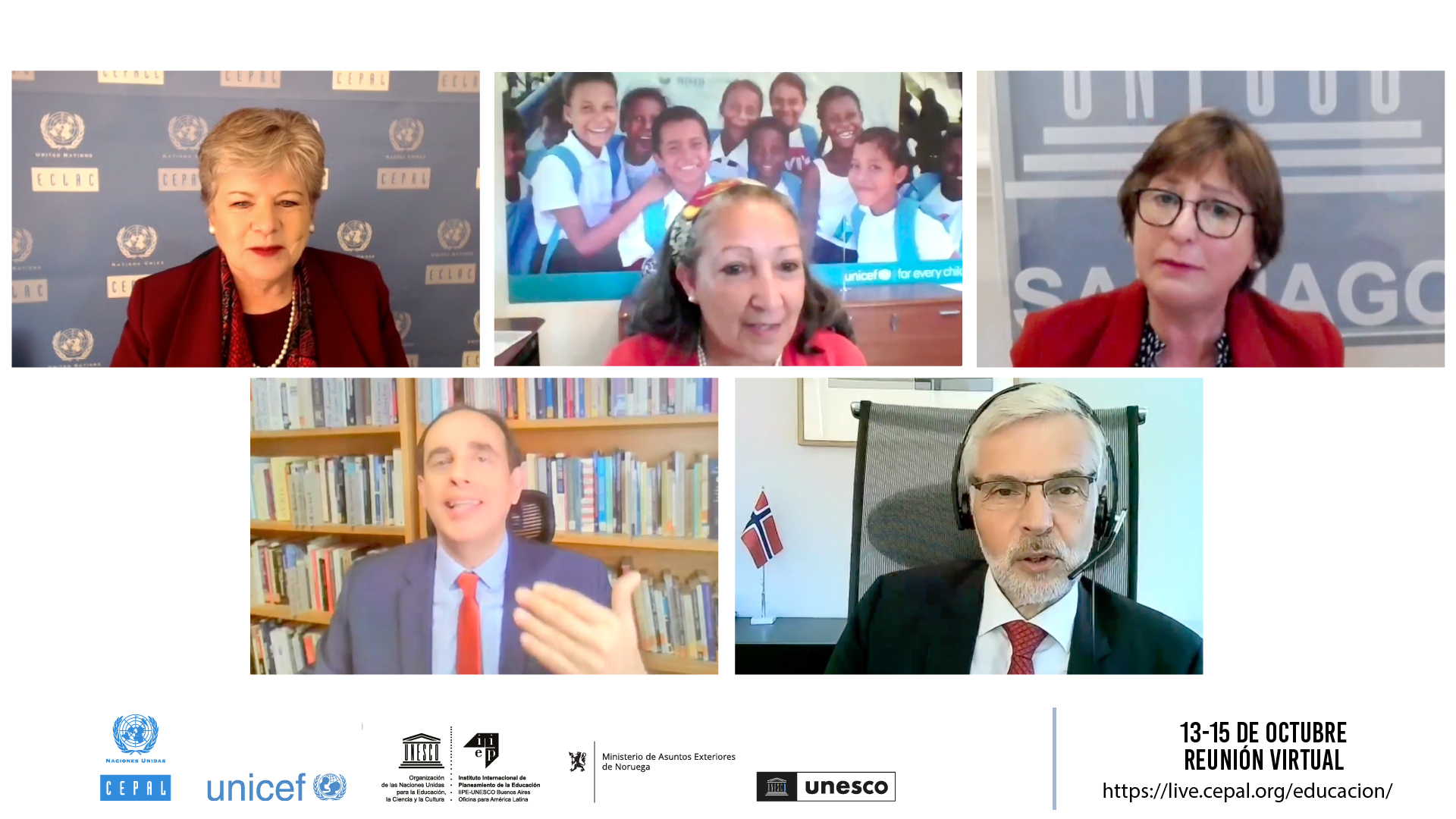First Regional Seminar on Social Development "Education in Latin America and the Caribbean: the prolonged crisis as an opportunity for restructuring"
Área(s) de trabajo
Resumen
Education is a fundamental human right, at the heart of the 2030 Agenda for Sustainable Development, and key to achieving a comprehensive social and labour inclusion of the population, while also contributing to economic growth, equality, and civic participation in society. Research has shown that higher levels of education are associated with the reduction of poverty and inequality, the improvement of health indicators, the possibilities of access to decent work, upward social mobility, and a more active civic engagement. Education is also central in relation to the structural changes required in Latin America and the Caribbean, based on capacity building.
Información del evento

Fecha
13 - 15 Oct 2021, 07:30 - 14:00Tipo de evento
Participación
The Division of Social Development of ECLAC organizes this First Regional Seminar on Social Development aims to reflect on education as an engine of social development with the participation of experts from the United Nations and multilateral organizations, scholars, and policy-makers within the education sector in the region. In particular, the Seminar aims to discuss the strategies and policies that are being proposed in the field of education as part of a transformative recovery with equality and sustainability in the region.
Información práctica
VIDEO DAY 1 13 October 2021
VIDEO DAY 2 14 October 2021
Registration:https://cepal-org.zoom.us/webinar/register/WN_wqYq3DMlQJKUJIoglnu5jA
Live Event Link: https://live.cepal.org/educacion/english.html
Contenido relacionado

La pandemia abre una oportunidad para reestructurar sistemas educativos de la región y enfrentar “crisis silenciosa” que vive el sector, plantearon especialistas en seminario regional
Alicia Bárcena, Secretaria Ejecutiva de la CEPAL, señaló que el impacto de la crisis sanitaria en la población infantil y en la juventud ha sido multidimensional y desigual. Más de 600.000 niñas,…
Agenda
|
Wednesday, October 13th |
|
|
11:00am - 11:30am |
Opening Session Moderator: Alberto Arenas de Mesa, ECLAC
Alicia Bárcena, Executive Secretary, ECLAC Jean Gough, Regional Director, UNICEF/LACRO Claudia Uribe, Regional Director OREALC/UNESCO Pablo Cevallos Estarellas, Director IIEP UNESCO Buenos Aires Jostein Leiro, Norway Ambassador in Chile |
|
11:30am - 1:00pm |
The opportunity to rebuild more inclusive and resilient education systems Moderator: Jean Gough, UNICEF/LACRO
Main presenter: Alicia Bárcena, Executive Secretary, ECLAC (30 minutes)
Discussants (10 minutes per-person): Jaime Perczyk, Minister of Education, Argentina Jorge Poblete, Undersecretary of Education, Chile Paula Villalta Olivares, Viceminister of Education, Costa Rica Cinthya Game Varas, Viceminister of Education, Ecuador Ricardo Cardona Alvarenga, Viceminister of Education, Science and Technology, El Salvador
Discussion (10 minutes) |
|
Break |
|
|
3:00pm - 5:00pm |
Adolescents and young people during the pandemic –an inclusive Secondary School Moderator: Pablo Cevallos Estarellas, IIEP UNESCO Buenos Aires
Main Presenter: Daniela Trucco (ECLAC) and Felicitas Acosta (Universidad Nacional de General Sarmiento, Argentina): Study on the diversification and segmentation of secondary education and the experiences of young people in a pandemic by ECLAC, Norway, IIEP-UNESCO Buenos Aires and UNICEF (40 minutes)
Discussants (15 minutes per-person): Javier González, SUMMA: Valuing diversity in contrast to the persistence of discrimination, stigmatization, and prejudice. Juan Pablo Valenzuela, Universidad de Chile: Urgent considerations for educational inclusion in the prolonged crisis Vincenzo Placco, UNICEF/LACRO: Successful alternative education programs for adolescents with unfinished educational trajectories
Discussion (35 minutes) |
|
Thursday, October 14th |
|
|
11:30am - 1:00pm |
Educational recovery agenda in the face of the pandemic Moderator: Claudia Uribe, OREALC/UNESCO
Main Presenter: Alejandro Vera (OREALC/UNESCO) and Ruth Custode (UNICEF/LACRO) National educational responses against COVID-19 in the region (40 minutes)
Discussants (15 minutes per-person): Andreas Schleicher, Director for Education and Skills, OECD Lessons for education during the coronavirus crisis Francis Jones, ECLAC subregional headquarters for the Caribbean: Inclusion and socio-emotional well-being in education during the pandemic in the Caribbean Paulina Araneda, President of the Council of Chile’s Agency for Education Quality: What to do first when what you were doing is no longer so useful
Discussion (35 minutes) |
|
Break |
|
|
3:00pm - 5:00pm |
Necessary skills and competencies in a changing context Moderator: Daniela Trucco, ECLAC
Main presenter: María Luisa Marinho (ECLAC) and Tamara Díaz (OEI): Study on education, youth and employment: necessary skills and competencies in a changing context (40 minutes)
Discussants (10 minutes per-person): Cristóbal Cobo (World Bank): Priority skills to train during the crisis Fabio Senne (CETIC, Brasil): Digital divide and digital skills training in the context of the pandemic Cora Steinberg (UNICEF): Policies for Skills Development in High School Ana Güezmes (Director, Division of Gender Affairs, ECLAC): Inclusion of women in scientific and technological skills training
Discussion (40 minutes) |
|
Friday, October 15th |
|
|
10:30am - 12:30pm |
Education, comprehensive social protection and pandemic Moderator: Claudia Robles, ECLAC
Main presenter: Alejandra Trossero (UNICEF) and Néstor López: Study on comprehensive protection of adolescents (ECLAC-UNICEF/LACRO) (40 minutes)
Discussants (15 minutes per-person): Mercedes Mateo (Chief, Education Division, IDB): Impacts of the crisis on education Daniel Titelman (Director, Division of Economic Development, ECLAC): Active youth labour inclusion policies during the crisis Cecilia Rossel (Universidad Católica del Uruguay): Educational components of non-contributory cash transfer programs Discussion (35 minutes) |
|
12:30pm - 13:00pm |
Closing Session: Articulation of educational policies with other social policies and the opportunity to rethink education Moderator: Claudio Santibañez, UNICEF/LACRO
Jostein Leiro, Norway Ambassador in Chile Alberto Arenas de Mesa, Director, Division of Social Development, ECLAC |
Adjunto(s)
-
Presentación Alicia_Bárcena_13_10_2021
Sesión 2_Presentacion_D_Trucco_F_Acosta_13-10-2021
Sesión 1_Presentacion_MINEDUC_Chile_13-10-2021
Sesión 3_ Presentacion_UNESCO_Respuestas educativas nacionales COVID_14-10-2021
Sesión 3_Presentacion_UNICEF LACRO_Reapertura de escuelas_14-10-2021
Sesión 3_Comentarios_Andreas_Schleicher.pdf
Sesión 4_Presentacion_F_Senne_14102021
Sesión 4_Presentacion_T_Diaz_ML_Marinho_14102021
Sesión 4_MENTIMETER
Hacia una generacion de politicas para el desarrollo integral de las y los adolescentes_N_Lopez_non paper
Documentos de la reunión
Institución organizadora
Comisión Económica para América Latina y el Caribe (CEPAL)
- https://www.cepal.org
- 56 222100000
Organización de las Naciones Unidas para la Educación, la Ciencia y la Cultura
- http://www.unesco.org/es
- telephone
Contacto
Daniela Trucco
- daniela.trucco@cepal.org
- (56-2) 2210 2530
Amalia Palma
- amalia.palma@cepal.org
- (56-2) 2210 2343